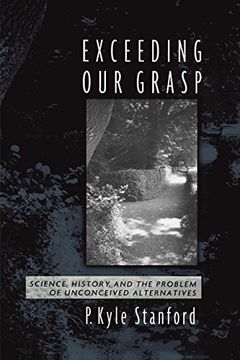Compartir
Exceeding our Grasp: Science, History, and the Problem of Unconceived Alternatives (en Inglés)
P. Kyle Stanford (Autor)
·
Oxford Univ Pr
· Tapa Blanda
Exceeding our Grasp: Science, History, and the Problem of Unconceived Alternatives (en Inglés) - P. Kyle Stanford
S/ 250,79
S/ 501,59
Ahorras: S/ 250,79
Elige la lista en la que quieres agregar tu producto o crea una nueva lista
✓ Producto agregado correctamente a la lista de deseos.
Ir a Mis Listas
Origen: Estados Unidos
(Costos de importación incluídos en el precio)
Se enviará desde nuestra bodega entre el
Lunes 03 de Junio y el
Lunes 17 de Junio.
Lo recibirás en cualquier lugar de Perú entre 2 y 5 días hábiles luego del envío.
Reseña del libro "Exceeding our Grasp: Science, History, and the Problem of Unconceived Alternatives (en Inglés)"
The historical record of scientific inquiry, Stanford suggests, is characterized by what he calls the problem of unconceived alternatives. Past scientists have routinely failed even to conceive of alternatives to their own theories and lines of theoretical investigation, alternatives that were both well-confirmed by the evidence available at the time and sufficiently serious as to be ultimately accepted by later scientific communities. Stanford supports this claim with a detailed investigation of the mid-to-late 19th century theories of inheritance and generation proposed in turn by Charles Darwin, Francis Galton, and August Weismann. He goes on to argue that this historical pattern strongly suggests that there are equally well-confirmed and scientifically serious alternatives to our own best theories that remain currently unconceived. Moreover, this challenge is more serious than those rooted in either the so-called pessimistic induction or the underdetermination of theories by evidence, in part because existing realist responses to these latter challenges offer no relief from the problem of unconceived alternatives itself.Stanford concludes by investigating what positive account of the spectacularly successful edifice of modern theoretical science remains open to us if we accept that our best scientific theories are powerful conceptual tools for accomplishing our practical goals, but abandon the view that the descriptions of the world around us that they offer are therefore even probably or approximately true."Stanford has genuinely advanced the philosophical discussion about scientific realism with his careful articulation of the problem of unconceived alternatives."-- The Review of Metaphysics "Stanford's book deserves to be widely read. Its central argument is clearly stated, its conclusion is radical, it engages in a productive fashion with detailed case studies, and it lays down several substantial challenges to scientific realism. Lastly, it is consistently thought-provoking."-Science
- 0% (0)
- 0% (0)
- 0% (0)
- 0% (0)
- 0% (0)
Todos los libros de nuestro catálogo son Originales.
El libro está escrito en Inglés.
La encuadernación de esta edición es Tapa Blanda.
✓ Producto agregado correctamente al carro, Ir a Pagar.

